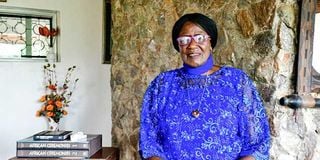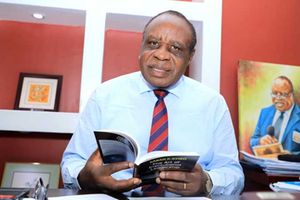
Ms Mary Okello at her home in Karen, Nairobi on March 5, 2024.
Two crucial matters before I proceed. First, when I say, “Jambo Bwana!” now, you know what I mean. Teddy Kalanda Harrison, the founder of the 50-year-plus old Them Mushrooms band, has left us. We will reflect on his cultural significance after we relatively recover from the shock of losing him.
Secondly, please, forgive me for my having “diminished” your weekend with my failure to appear in this column last Saturday. This was due to a fatal last-minute internet communication breakdown between me and my editor. I was deeply touched and moved by your many anxious inquiries about my non-appearance. I knew I was liked, but I had not realised I could be that seriously missed. Thank you for loving me.
The spirit of education has been upon me for the past few weeks. This is due to a number of random encounters and developments that have strongly redirected my mind back to my classroom experiences, both as a student and as a teacher, dating back 1953, when I was admiring Ms Mukasa, my classroom teacher.
To return to the present, the cocktail of teacher-stirring incidents includes my brief but inspiring recent encounter with the KICD Director, of which I told you. Then there was a visit to the redoubtable Dr Mary Okello at the Kibos Makini School near Kisumu. Thirdly and sadly, I got news of the passing on, in Liverpool, of one of my most influential teachers, the Reverend Fr Damien Grimes.
Dr Mary Okello invited me to her residence in appreciation of the eulogy I wrote for the late Margaretta wa Gacheru, her long-time assistant and communications officer at the Women’s Finance Trust. Dr Okello (née Awori), a member of the remarkable Awori family of Kenya and Uganda, about which a new insightful book has been recently published.
Do you remember the times of Kenyan Vice-President Moody Awori and his nephew, Aggrey Awori, a Presidential Candidate in Uganda?
Dr Elizabeth Mary Awori Okello, however, is a celebrity in her own right. Apart from being a female pioneer in topflight banking in Kenya, she was the founder of the Women’s Finance Trust, recognised as the first women’s banking institution in Africa, and replicated across the continent. My former colleague at Kenyatta University, Dr Jennifer Riria, left her post at the university to join Dr Okello in that remarkable venture.
My closest connection with her would obviously be her foundation of the Makini System of schools, with campuses in Nairobi, Kisumu and elsewhere in the country. “Makini”, in Kiswahili, means 'serious sense’, focused attention, a laudable expectation of a worthwhile education. But in our brief chat I found out that we probably had a lot more in common than I had expected, including a few parallel student years at Makerere.
From hobnobbing with the greats in Kisumu, I fell into the Kampala gloom following the loss of the Rev Damien Grimes, M. A., OBE, the clerical Yorkshireman, whose name is almost synonymous with top quality Ugandan education in the latter half of the twentieth century. Though obviously trained for church ministry, Grimes, who passed away recently at the venerable age of 93, did little conventional parochial work in Uganda, where he spent nearly all of his working life.
Instead, from the moment he was sent to Uganda by the Mill Hill Missionaries, he was in classrooms almost to his last working day. My close encounter with him was in the immediate pre-independence and post-independence years, 1961-1964, when I was doing my O- and A-level studies at Namilyango College.
Namilyango, founded by the Mill Hill priests in 1902, was the first boarding school in Uganda. Targeting the sons of the Ugandan aristocracy, it was modelled on the so-called English Public Schools, and it was always recognised as a centre of excellence, at the time. It produced many prominent personalities, including the Olympian boxing medallists, Tom Kawere and Francis Nyangweso.
But Fr Grimes (and maybe others of similar thinking) were getting increasingly dissatisfied with the prevalent approach to education, especially in the secondary schools of the time. Grimes and his ilk felt that those schools, most of them church sponsored, were too “narrow” and too soft on their young charges to produce the kind of leaders needed by the newly independent country. The typical products were too academic and elitist to handle the challenges of the new nation.
Grimes’ tentative approach to reform was what he called the “renaissance prince/princess” alternative. This was the raising of people who were both motivated and guided to be fully and practically involved in all the major issues of their times, and with the confidence and adaptability to adjust to any eventualities. The problem for Grimes was that he saw no way of effecting such reforms through the formalities of church hierarchy and government bureaucracy.
So, he decided to strike out on his own, by establishing a private school, in an abandoned railway station just off the banks of the Nile. Private schools were not, until recently, particularly popular in Uganda. You may want to read Grimes’ Uganda: My Mission, to get some insight into how he succeeded in raising his Namasagali College (“Shaggs” to its devotees) from a dilapidated railyard to arguably the most respected Ugandan secondary education facility of the last third of the century.
Many lessons could be learnt from the pioneering efforts of educationists like Mary Okello and Fr Damien Grimes. My own line of reflection is that educational reform should be a continuous and relentless process of experiment and renovation. More importantly, it may be generally unpopular to credit any expatriates with positive contributions to local developments, especially during the colonial period. But I think it is high time that we started evaluating dispassionately the contributions to our educational systems of people like Carey Francis, Geoffrey Griffin and Damien Grimes.
Incidentally, the book about Dr Mary Okello’s Awori family is titled Seizing the Moment: The Amazing Story of the Awori Family.
Prof Bukenya is a leading East African scholar of English and literature. [email protected]





